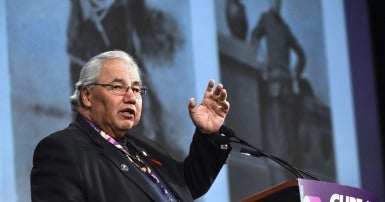The theme of this year’s National Aboriginal Day is “Promoting truth and reconciliation.”
The Truth and Reconciliation Commission (TRC) was established in 2006 to investigate the truth about Indian Residential Schools and promote healing and reconciliation between Indigenous and non-Indigenous peoples in Canada. The final report provides a detailed history of the experiences of Indigenous children in the schools and includes 94 calls to action directed to all levels of government, churches, other organizations and the public.
The TRC describes the Indian Residential School system as part of Canada’s assimilationist policy against Indigenous peoples. Children were taken away from their families and placed in government-funded, usually church-run schools often very far from their communities. They were denied their language, culture, heritage and meaningful parenting or community care. The children suffered emotional, psychological, physical, and sexual abuse at the schools. Thousands of children died.
There were hundreds of residential schools operating across Canada for over 100 years. The last school closed in 1996. It is estimated that over 150,000 First Nations, Inuit, and Métis children were placed in the schools.
The TRC also highlighted child welfare policies in Canada which have overseen the removal of Indigenous children from their families. Many of these children were fostered or adopted out, mainly to non-Indigenous families. It is estimated that some 20,000 Indigenous children were removed from their families between the 1960s and the late 1980s. According to Statistics Canada, in 2011, more than 14,000 Indigenous children are currently ‘wards of the state’—representing almost half of all children in Canada in foster care. Indigenous children are taken from their families at a rate three times higher than at the peak of residential schools in 1949, and six to eight times the rate of non-Aboriginal children.
There have been many reports that document intergenerational experiences of a mass atrocity where the damage done to one generation perpetuates in the lives of the next. The consequences of Canada’s past and current policies are felt in Indigenous families and communities across the country today. There have been three consecutive generations of Indigenous families who have suffered the theft of their children due to government legislation and policies.
What is CUPE doing?
At our 2015 National Convention, delegates adopted a resolution on truth and reconciliation. It states that CUPE will affirm its commitment to reconciliation; call upon governments in Canada to ensure the implementation of the TRC’s calls to action; educate our members on the residential school system and the attempted genocide of Aboriginal peoples in Canada; and support Indigenous organizations and grassroots activism in efforts to promote healing and reconciliation.
We know that many CUPE members are committed to doing their part in truth and reconciliation. At union events, our divisions, sectors and locals have been hosting speakers on truth and reconciliation to explore what they can do to support the calls to action. CUPE has also begun developing a module on truth and reconciliation in our Indigenous awareness course.
We will continue to be an active partner with our Indigenous allies across Canada, supporting their crucial work on the issue of missing and murdered Indigenous women and girls, environmental degradation due to resource development policies, and the need for major public investments in Indigenous education, health care, social services, water infrastructure and housing.
Some of the organizations that we have worked with and will continue to support are Idle No More, Defenders of the Land, the Native Women’s Association of Canada, the Assembly of First Nations, the Métis Nation, First Nations Child & Family Caring Society of Canada, Families of Sisters in Spirit, and tears4justice. We’ve also worked with Friendship Centres as well as First Nations communities who have been battling grave injustices, such as Grassy Narrows and Barriere Lake.
What can you do?
This National Aboriginal Day we encourage you to take action on truth and reconciliation.
- Read the TRC Final Report and consider how you can support the calls to action.
- Invite a speaker to your next meeting to talk about truth and reconciliation.
- Ask for CUPE’s Indigenous Awareness workshop and our human rights course.
- Make employment equity a bargaining priority. Ensure a workplace that welcomes Indigenous workers by bargaining collective agreement language that responds to their needs.
- Acknowledge Indigenous territory at all of your meetings, and reach out and forge partnerships with local Indigenous communities and organizations.
- Sponsor and promote Indigenous events and advocacy.


